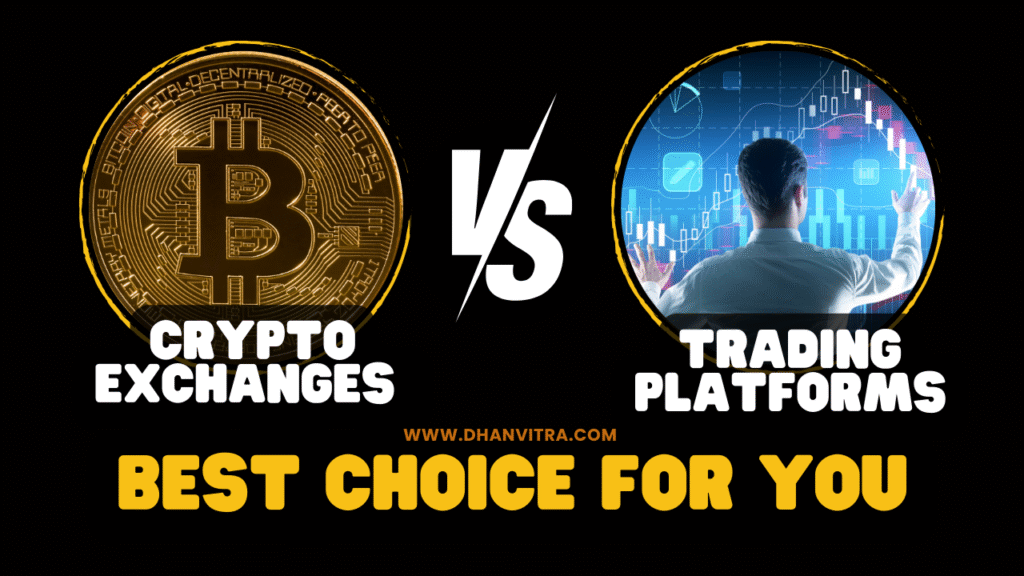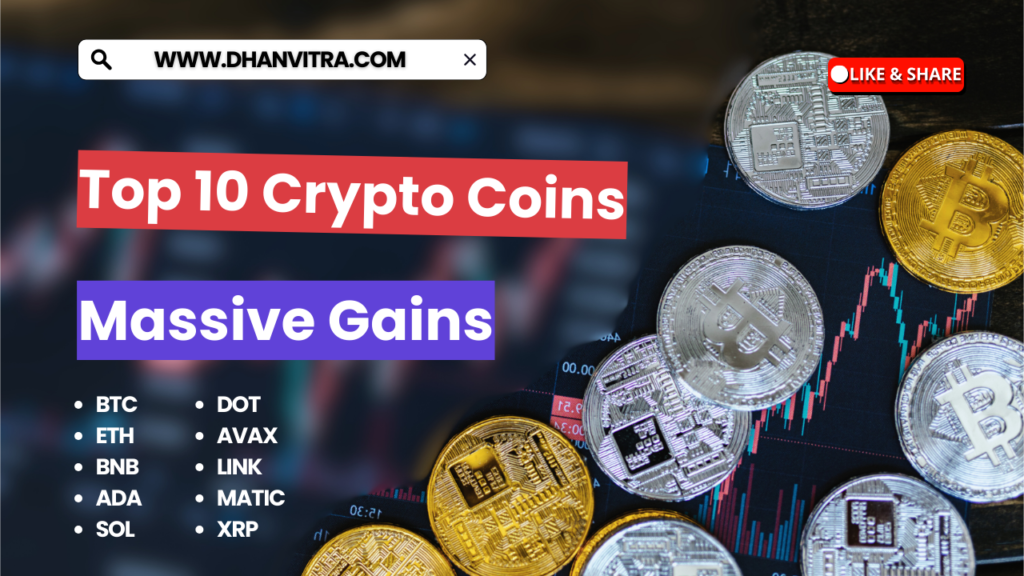
Welcome to Dhanvitra, your trusted guide in the world of finance, investments, and emerging technologies. At Dhanvitra, we simplify complex financial topics, enabling you to make smarter money decisions with confidence.
The crypto market has become one of the most exciting frontiers in finance, attracting both beginners and seasoned investors. However, before you begin your journey, a crucial decision awaits: should you use a Crypto Exchanges vs Trading Platforms?
This blog dives deep into the differences between the two, exploring how they work, their pros and cons, and which option might suit your financial goals best. Whether you’re a long-term investor looking to hold digital assets or an active trader chasing short-term gains, this guide will help you choose wisely in the ever-evolving world of crypto.
Table of Contents
Basics of Crypto Exchanges vs Trading Platforms
Before diving deeper, it’s important to clearly understand what we mean by a crypto exchange and a trading platform. At first glance, both might seem similar—they allow you to buy, sell, or trade digital currencies. However, their core purposes and functions are slightly different.
A crypto exchange is essentially a marketplace where buyers and sellers meet to trade cryptocurrencies. Think of it as a digital stock exchange, but instead of trading company shares, you’re dealing with coins like Bitcoin, Ethereum, or thousands of other tokens. Exchanges focus on providing access to a wide variety of cryptocurrencies for both beginners and seasoned investors.
A trading platform, on the other hand, goes beyond simple buying and selling. It’s designed for users who want more advanced features such as margin trading, futures, leverage, and detailed charting tools. While exchanges cater to anyone entering the crypto space, trading platforms are built for people who want to actively trade and explore strategies to maximize profit.
Types of Crypto Exchanges
The crypto industry has evolved rapidly, giving rise to different types of exchanges. Each type caters to different user needs and trading preferences.
Centralized Exchanges (CEX)
Centralized exchanges are the most common and user-friendly. They are operated by companies that manage the platform and hold custody of user funds. Examples include Binance, Coinbase, and Kraken. CEXs are popular because they offer liquidity, customer support, and an easy interface.
Decentralized Exchanges (DEX)
Decentralized exchanges work differently. They operate without a central authority, allowing users to trade directly from their wallets using smart contracts. Platforms like Uniswap and PancakeSwap are well-known DEXs. The advantage here is privacy and full control over your funds. But they often come with lower liquidity and can be a bit complex for beginners.
Hybrid Exchanges
In order to provide the security and privacy of DEXs along with the liquidity and ease of use of CEXs, some platforms attempt to blend the finest features of both. These hybrid models are still evolving, but could become more common as users demand better control and safety without losing efficiency.
Types of Trading Platforms
Just like exchanges, trading platforms come in various forms, each catering to a different trading style.
Brokerage-Style Platforms
These platforms act as intermediaries. Instead of matching buyers and sellers like exchanges do, they provide a direct way to purchase crypto, often at a fixed price. Think of it like buying foreign currency from a bank instead of using a currency exchange market.
Derivatives and Margin Trading Platforms
These platforms allow traders to go beyond buying and selling coins. You can trade futures, options, and leverage—meaning you can borrow funds to increase your position size. Platforms such as BitMEX or Bybit are popular among professional traders who want to maximize gains, though the risks are equally high.
Copy-Trading Platforms
Copy-trading is an interesting innovation. It’s like having an expert trade for you while you learn along the way. This is gaining popularity among newcomers who want exposure without making every decision themselves.
Key Differences Between Exchanges and Trading Platforms
While both serve the purpose of engaging with cryptocurrencies, some clear differences define which might be right for you.
A crypto exchange is primarily about ownership of assets. When you buy coins on an exchange, you’re actually purchasing and holding them—just like owning gold or stocks. In contrast, a trading platform is more about speculation—you may not always own the underlying coin, but instead profit from price movements through contracts or leverage.
Accessibility is another difference. Exchanges usually welcome everyone, from beginners to experts, and focus on simplicity. Trading platforms, however, often target advanced traders with technical tools, complex orders, and financial products.
Lastly, regulation and security vary. Centralized exchanges are increasingly regulated and follow Know Your Customer (KYC) rules, making them more secure for the average user. Many trading platforms, especially those offering derivatives, face stricter regulations in certain countries and might not be available everywhere.
Pros of Crypto Exchanges
Crypto exchanges have gained massive popularity for good reasons, and understanding their strengths helps you see why they attract millions of users globally.
The biggest advantage is easy access to cryptocurrencies. Whether you want Bitcoin, Ethereum, or smaller altcoins, exchanges usually offer hundreds of options. Because of this, they are appealing to investors who want to diversify their portfolios for the long term.
Liquidity is another major benefit. High trading volumes ensure that you can buy or sell quickly without huge price slippage. This is especially important for big investors and institutions.
Exchanges are also relatively user-friendly, offering simple interfaces, mobile apps, and fiat on-ramps. In most cases, you can deposit your local currency, purchase crypto, and start your journey within minutes.
Finally, centralized exchanges often come with added features like staking, lending, and savings accounts, allowing users to earn passive income while holding their digital assets.
Cons of Crypto Exchanges
While crypto exchanges make it easy for anyone to jump into the digital asset market, they come with their fair share of drawbacks. One major concern is security risks. Centralized exchanges, in particular, store large amounts of users’ funds in hot wallets, making them attractive targets for hackers. History has shown us several high-profile exchange hacks that led to billions of dollars in losses.
Another limitation is the custodial nature of exchanges. In simple terms, when you store your crypto on an exchange, you don’t technically own it. There is a reason why the well-known adage, “not your keys, not your crypto,” exists—your money may be locked if the exchange closes, files for bankruptcy, or restricts withdrawals.
Exchanges also often impose withdrawal limits and fees. Depending on the platform, you might pay network fees, transaction fees, and even hidden costs when moving your crypto to another wallet. For global users, especially those in regions with strict regulations, exchanges might restrict certain services or even block accounts, which can be frustrating.
In short, while exchanges are convenient, they don’t always give you full control or freedom over your digital assets.
Pros of Trading Platforms
Trading platforms stand out for their ability to offer advanced trading features. Unlike basic exchanges, these platforms provide detailed charting tools, multiple order types, technical indicators, and access to spot, margin, and futures markets. For global traders who want flexibility, this opens up countless opportunities.
Another big advantage is leverage trading. While risky, leverage allows users to multiply their exposure without having to invest the full capital upfront. For example, with 10x leverage, a trader with $100 can open a $1,000 position. This attracts experienced traders who want to maximize potential gains.
Many trading platforms also integrate copy trading or social trading, where beginners can automatically replicate the moves of successful traders. This lowers the learning curve and makes trading accessible to those new to the crypto space.
For people across different countries, especially in emerging markets, trading platforms often provide a user-friendly experience with mobile apps, demo accounts, and AI-driven insights. This helps bridge the gap between professionals and everyday users, making global participation much easier.
Cons of Trading Platforms
The biggest one is risk exposure. Features like leverage and derivatives can amplify both profits and losses. A single wrong trade could wipe out an account, making it unsuitable for casual investors or beginners.
Another limitation is restricted coin availability. Unlike large exchanges that list hundreds of tokens, many trading platforms focus on major cryptocurrencies like Bitcoin, Ethereum, or a handful of others. This can feel limiting for those who want access to new or niche coins.
Regulation is another issue. Trading platforms often face strict rules in different countries, and some may not be available globally. Users in regions with tight financial regulations may find it difficult to access advanced trading services. Additionally, frequent KYC (Know Your Customer) checks and compliance requirements can slow down onboarding for new users.
So while trading platforms empower active traders, they also require a higher tolerance for risk, strong discipline, and constant awareness of regulations.
Which One Is Safer?
The crypto industry has always placed a high priority on security. Both exchanges and trading platforms have their own security measures, but neither is entirely risk-free.
Exchanges often provide features like two-factor authentication (2FA), cold wallet storage, and insurance funds against hacks. However, the fact that they hold users’ private keys makes them more vulnerable to large-scale breaches. If the platform fails, your crypto could be at risk. Exchanges often provide features like two-factor authentication (2FA), cold wallet storage, and insurance funds against hacks. However, the fact that they hold users’ private keys makes them more vulnerable to large-scale breaches. If the platform fails, your crypto could be at risk.
Trading platforms, on the other hand, are generally safer in terms of trading execution but riskier in financial exposure. Since most are centralized, users still rely on the platform’s infrastructure to keep funds secure. Moreover, platforms offering leverage expose traders to rapid liquidation risks, which is another kind of danger.
For global users, the safest approach is often to use exchanges or platforms for transactions but store assets in a private wallet where you control the keys. This combination balances convenience with true ownership.
Costs & Fees Comparison
When it comes to money, fees can make a huge difference—especially for active traders. On crypto exchanges, the most common charges are trading fees, which are usually a percentage of each transaction. Some platforms also charge deposit and withdrawal fees, which can vary depending on whether you use bank transfers, credit cards, or crypto transfers. For international users, these costs can add up quickly due to currency conversion charges.
On trading platforms, fees can be more complex. You’ll find spreads (the difference between buy and sell prices), overnight financing costs for leveraged trades, and commissions on futures or options. While platforms may advertise “zero-fee” trading, hidden costs like slippage and spreads often exist in the background.
Globally, users should also consider regulatory costs. In certain countries, additional taxes or compliance fees may apply when using either exchanges or platforms. Understanding the full fee structure before committing is essential, as costs can significantly impact your long-term profits.
Who Should Use Crypto Exchanges?
Crypto exchanges are the go-to platforms for people who want simple, direct access to cryptocurrencies. If you are new to the crypto world and just want to buy your first Bitcoin or Ethereum, exchanges are your best friend. They are designed for beginners and long-term investors who prioritize ease of use over advanced trading features.
Exchanges also suit those who want to hold coins for the long run, often referred to as “HODLing.” With a wide variety of tokens available, you can diversify your portfolio without much hassle. Another advantage is liquidity—since exchanges usually have high trading volumes, you can buy or sell assets quickly without much price fluctuation.
However, if you’re using an exchange, remember that most are custodial in nature. For investors who want exposure to crypto but don’t want the stress of managing complex trading strategies, exchanges remain the best starting point.
Who Should Use Trading Platforms?
Trading platforms are ideal for people who want to do more than just buy and hold. If you enjoy active trading, analyzing charts, and making quick moves based on market shifts, a trading platform is built for you. Unlike exchanges, these platforms offer advanced tools such as leverage, margin trading, futures contracts, and copy-trading features.
They are especially useful for professional traders and risk-takers who want to maximize profit opportunities from even small price changes. Platforms also often provide deeper analytics, customizable interfaces, and automated trading options that help experienced traders execute their strategies.
That said, trading platforms come with higher risks, particularly if you are using leverage. If you’re someone with strong risk management skills, knowledge of market trends, and the discipline to handle volatility, a trading platform may fit your style better than a basic exchange.
What to Look for in Your Crypto Journey
No matter which option you choose, there are key factors every global investor or trader should consider before diving in. The first is regulation and trustworthiness. A platform’s credibility matters because the crypto industry is still evolving, and scams or poorly managed platforms exist. Always research where the platform is registered, whether it complies with international regulations, and if it offers insurance or protection for your assets.
The user experience is another critical factor. Beginners might prefer simple interfaces, while advanced traders will look for customizable dashboards. Security should never be compromised—look for features like two-factor authentication (2FA), cold storage for assets, and transparent policies.
Whether you are facing withdrawal delays or technical issues, responsive support can make your crypto journey smoother. Remember, your choice isn’t just about buying or trading—it’s about building confidence in a system that manages your financial future.
Future of Crypto Exchanges and Trading Platforms
The future of crypto trading is likely to see a blend of exchanges and trading platforms merging into one ecosystem. Already, we’re seeing exchanges offering advanced trading tools, while trading platforms are expanding to include basic buy-and-sell services. This hybrid approach ensures that both beginners and professionals get what they need in one place.
Another strong trend is the rise of decentralized solutions. Decentralized exchanges (DEXs) are gaining traction globally because they allow users to trade without giving up custody of their assets. As blockchain technology evolves, we may see DEXs becoming just as fast and liquid as centralized exchanges, offering a safer and more transparent option.
Imagine AI-driven trading platforms that analyze global market trends in real-time and make smarter decisions on your behalf. As adoption grows, competition between platforms will likely drive innovation, giving users better fees, more options, and stronger security.
For global users, this means more accessibility and personalization in crypto trading experiences, no matter where you live or what your trading style is.
Conclusion
The choice between crypto exchanges and trading platforms ultimately depends on your financial goals, experience level, and risk tolerance. If you’re a beginner, a crypto exchange is like your stepping stone—it’s safe, simple, and offers a wide selection of coins. For long-term investors, exchanges are also perfect for building a diverse crypto portfolio.
On the other hand, if you’re an active trader who thrives on market volatility, a trading platform gives you all the tools to maximize opportunities. With leverage, futures, and analytics at your fingertips, you can turn even small price swings into potential profits. But remember, with higher rewards come higher risks, and only those with strong strategies should dive deep into trading platforms.
No matter what you choose, always prioritize security, transparency, and regulation. The crypto industry is still young and evolving, but with the right platform, you can grow your investments, protect your assets, and enjoy the exciting journey of digital finance.
As global adoption of cryptocurrencies continues to expand, exchanges and trading platforms will keep evolving—eventually offering solutions that cater to every type of investor and trader. The future is bright, but it begins with one key decision: finding the right platform that matches your journey.
FAQs
Can I use both a crypto exchange and a trading platform?
Yes, many global investors do exactly that. They use exchanges for buying and holding assets, and trading platforms for active, short-term trading.
Which is better for beginners: exchanges or trading platforms?
Beginners are better off using exchanges because of their simplicity, ease of use, and wide variety of coins available.
Decentralized exchanges (DEXs) are they safer than centralized exchanges?
Since DEXs eliminate the need for custodians, you have control over your own money. However, they might have fewer customers and less liquidity than centralized exchanges.
Do I need to complete KYC on all platforms?
Not all, but most regulated platforms require Know Your Customer (KYC) verification for compliance and security. Decentralized platforms usually don’t require KYC.
What’s the future of crypto trading?
The future lies in hybrid models, decentralized finance (DeFi), AI-driven automation, and platforms that balance accessibility with advanced features, ensuring everyone from beginners to pros can participate.













Hey everyone! 🌟 I’ve been diving into the world of crypto exchanges and trading platforms lately, and it’s fascinating how each has its perks. What’s your go-to choice? Let’s share our experiences! 🚀
Great discussion topic! I think it really depends on what you’re looking for—some exchanges have lower fees, while others offer more coins. What features matter most to you? 💰✨
I love how different crypto exchanges cater to various needs! Whether you’re a newbie or a pro, there’s something for everyone. Which platform do you find the most user-friendly? 🤔💬
I’ve been exploring both sides of the coin—exchanges vs trading platforms—and it’s tough to pick a favorite! Each has unique benefits that suit different styles. Would love to hear your thoughts! 🧐💭
So interesting to see how crypto exchanges and trading platforms stack up against each other! I personally prefer one that has a great app for on-the-go trading. What about you guys? 📱💖